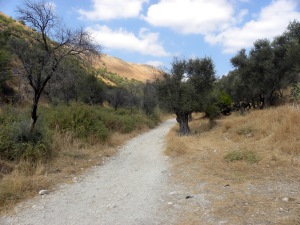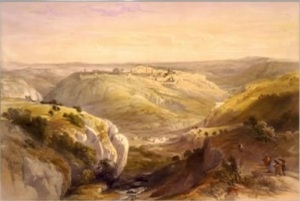He went on his way through towns and villages, teaching and journeying toward Jerusalem. And someone said to him, “Lord, will those who are saved be few?” . . . Luke 13:22-23a
He’s touring the towns and villages that the seventy disciples scouted out for him earlier. It looks like a meandering path—now east, then west, veering north, turning south—but the destination is never far from his mind. Everyone is going somewhere, whether they realize it or not; all those wrong turns and backups are ultimately headed in one direction.

A man falls in beside him as they walk along the road. “Lord! I have a question for you. Are only a few on their way to salvation?”
There’s a whole context here. Anyone who asks this question, in this way, probably considers himself among the in crowd, however exclusive it may be. The Lord spares him barely a glance. “Don’t worry about the number of the saved—just make sure you’re one of them.”
“But—“
“There’s a door, not wide. And there’s a time, not long. And there are those, not few, who think their place is assured, so they choose their own route and presume on my Father’s patience. They will be shocked to find the door locked against them, after strangers and sinners have already gone in. When they pound on the door and cry out, “Lord, don’t you remember us? We ate and drank with you and sat at your feet. We even walked beside you in the road.” He sent a quick, sharp glance to the questioner, a look that peeled the pretentions from the man. “And what will he say then? ‘I don’t know you. I never knew you. Depart from me.’”
At that, Jesus stepped up his pace, leaving the man in the dust, bewildered and suddenly fearful. But then Jesus stops and turns back, his face a little softer as though offering another chance. “Remember this: some who are last in line now will be first then. And some who are first will be last.”
Speaking of those who are first in line: a couple of miles down the road, on the outskirts of another town, a delegation of Pharisees and village elders meet him. “Are you Jesus of Nazareth? We have word that Herod is trying to kill you. If you value your life you’d better not stop here.”
“Is that so?” Jesus barely breaks his stride while brushing past them. “I have a word for you. If Herod asks, tell him I have business to attend to: evil to cast out and diseases to heal. If he wants to kill me he can line up with the rest. We can meet up in Jerusalem—everyone knows that’s the only place to kill a prophet!”
As he moves on, the Pharisees are stunned silent (as usual) and the disciples exchange uneasy glances. There he goes with Jerusalem again; what’s up with that?
At the top of a rise offering a clear view for miles around, he suddenly stops and turns toward the southeast, his face full of sadness.
“Jerusalem . . . my city! How many of my prophets have you slaughtered like lambs? How many times have you stopped up your ears? My arms ache with longing to pull you and your children toward me, but you were not willing—you dig in your heels and fold your arms and refuse. I see your ruined temple, like an abandoned watchtower in a vineyard. But you don’t see me. And you won’t, until the day you cry “Hosanna!” in the streets, and “Blessed it he who comes in the name of the Lord!”
There’s a glimmer on his face—would it be a tear track? Those closest to him are distracted by that; it’s only when he turns back to the road that they are struck with what he said. My city? My prophets? He talks like he owns the place. Even more: as if he always owned it . . .
For the original post in this series, go here.
Next>

